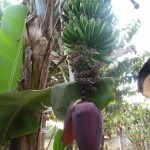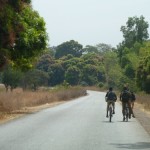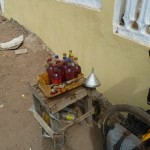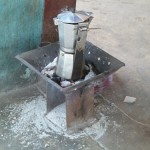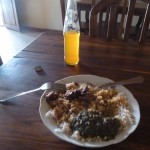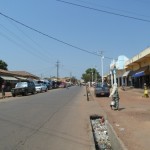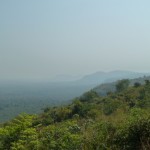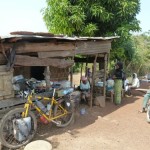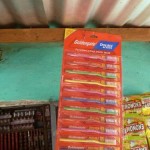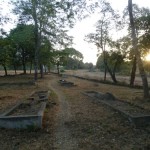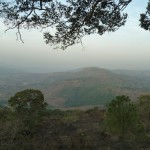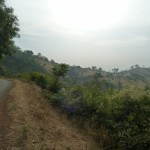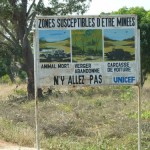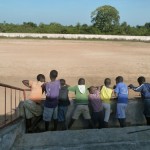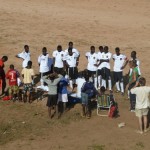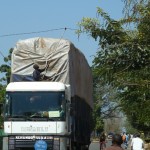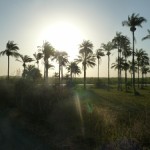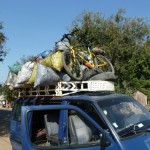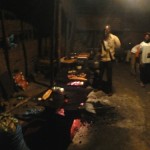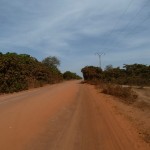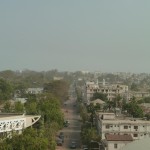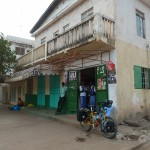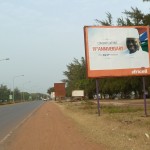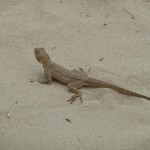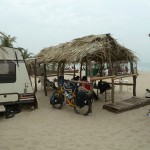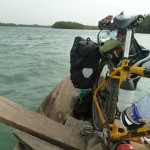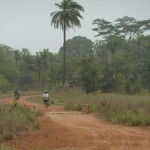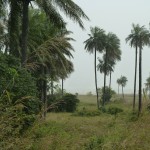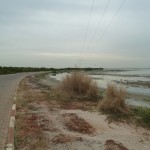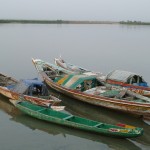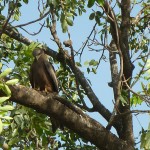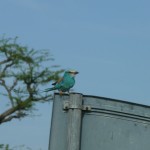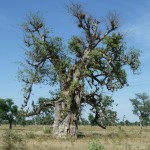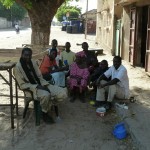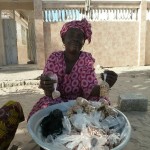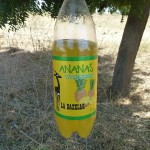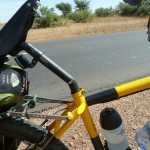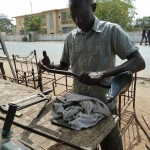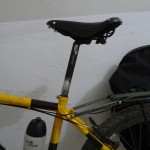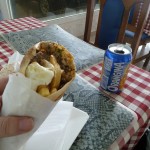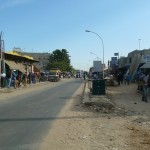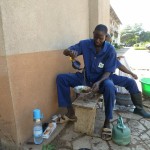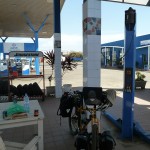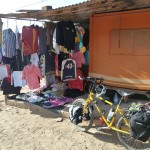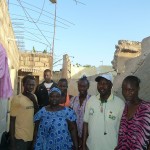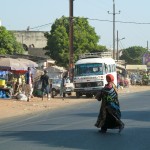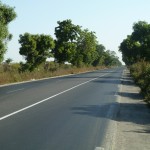It’s been a while since I’ve written a blog post, I survived the Guinea mountains and have now descended back to sea level and am in Sierra Leone.
I left Labe back on 7th January and headed for a town called Pita. I really liked Labe, the place I stayed was nice and quiet, with good food, cold beers and little tweeting birds in the trees, but it was a little bit expensive, especially for Guinea. But they did have hot running water! Each room had a hot water tank fed by a home made boiler, copper piping inside an old oil drum filled with water, and heated by a big charcoal fire underneath.
I went to the post office to post a letter to Emma (just to see what it was like and how long it would take). It was a big tumbledown colonial building with a huge counter with a lady behind. It took her about 5 minutes to look up how many stamps she needed to sell me, she kept them in her handbag! She didnt have any change for my money so had to nip to the shop over the road before she could give me my change (a very frequent occurance here).
While I was writing the letter at the counter a couple of people who ran a stationary business in the corner invited me to eat lunch with them. This kept happening in Guinea! We sat around a big bowl of very nice rice and groundnut soup in the corner of the post office, eating lunch! I’ve had lunch in a post office, in a remote village, and in the back of a petrol station, all spontaneously invited!
After Labe I stayed at a place in Pita called Chez Sister, a few km out of town. It was run by a Guinean lady and her Welsh husband, Captain Dave as he likes to be called! A retired Royal Navy captain with endless stories to tell about smuggling, people trafficking, drugs, weapons and even the eventual arrest of Charles Taylor! He’d been part of the British fleet patrolling the West African coast during the Sierra Leone civil war.
In Guinea they have good coffee everywhere. Normally made over a charcoal fire in a french stovetop coffee pot to make really strong espresso. Its kept hot in big thermos flasks and costs about 4p per cup! But as with all hot drinks in West Africa, they drink it with an unhealthy amount of sugar! I could stop at any roadside shack or cafe and find good coffee! I much prefer it to the sweetenned condensed milk variety in Guinea Bissau or the really spicy cafe touba I had in Senegal.
From Pita I cycled to Dalaba. It was a tough days riding, hilly, hot, but spectacular scenery through the mountains. I felt really ill after arriving and was sick all night, I felt better the next afternoon but still not 100%. I assumed that I’d got heat exhaustion, hadnt been drinking enough, or that I’d eaten or drunk something bad. I had a stomache ache and headache but pushed onto Mamou a few days later. Again great cycling through good scenery, one huge hill to get out of town but after that it was fairly easy going, more rolling hills than big mountain passes.
I stayed at a forestry school just outside of town. After speaking to Emma about still not feeling very well, I went into town to try and find somewhere to get tested for malaria…
I asked at a pharmacy who recomended a small clinic in town. I had a very strange consultaion where they weighed me, made me lie down on a very short bed (it was the size and height of a table!), took my blood pressure and my temperature using an armpit thermometer! They took a short history but I’m not really sure they recorded much of it.
They sent me over the road to a dodgy looking apartment/office block to have a blood test. No electricity here, no running water, but clean sterile needles and a microscope was on the desk. I gave some blood which was mixed with a few different chemicals. About an hour later after some microscope viewing we went back to the clinic over the road.
They brought out the record book for my appointment and said “these are the drugs you need to take” and pointed to a list of 4 words! Eventually it transpired that they’d diagnosed me with malaria, typhoid, lack of appetite and a headache, and had prescribed drugs for all, including a big bottle of appetite stimulant and paracetamol for the headache!
They’d only written down the brandnames of the drugs on the form which meant I had no idea what I was being prescribed! I asked to see the drugs and they brought out medicine that I was familiar with and could double check! A quick internet search later, I had some well recomended malaria treatment and some antibiotics for the typhoid. I don’t think they were planning on explaining how to take the treatment until I pushed them, even then they didnt really seem to know any of the details, just expecting me to read the leaflet with the drugs!
I really would have serious concerns going to a place like this for any sort of illness that required more treatment than common off the shelf drugs. They must prescribe these drugs relatively frequently but they didnt even seem to have much knowledge of them.
So I bought the drugs and started taking them. The next day I felt remarkedy better, completely healed! I stayed in Mamou for a few days until I had finished the malaria treatment.
After reading up about typhoid, I dont think I actually had it. The test they conducted involves checking for typhoid antibiodies in the blood, and given that I had a typhoid vaccination just a couple of months ago, I think they misdiagnosed me. They didnt ask me if I’d had a vaccination, didnt tell me they were testing me for typhoid, and I only realised afterwards that the test might have been invalid. But I’ve nearly finished the course of antibiotics, I figured that it probably wouldnt do any harm.
At the forestry school in Mamou I met three peace corps volunteers who’d come back from a training event in Conakary (the capital of Guinea). We went out for dinner together and to a small bar
afterwards. They were all fairly new to the peace corps, only a few months in. They each lived in a different village in Guinea on their own, working with the local community in teaching, or farming, completely immersed in local life and fairly isolated. I think they said that they each have a 2 year placement, its quite a commitment! With the introduction of mobile phones here, they were able to keep in touch with each other and meet up every few weeks in one of the bigger towns.
I left Mamou a while ago now and crossed the border into Sierra Leone, but that will have to wait for another blog post.
I really loved Guinea, the people were very friendly, the scenery was stunning, the roads mostly good and they had some basic facilities which are rare in this part of the world, a few hours of electricity each night, running water and solar street lights. These seem to be unheard of luxuaries in Guinea Bissau and Sierra Leone, the two neighboring countries I’ve seen. I’d like to go back to Guinea and explore a bit more.
